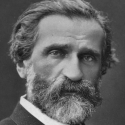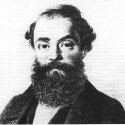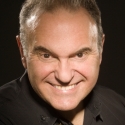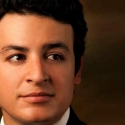La Traviata

|
Giuseppe VerdiComposer |
Giuseppe Verdi was born in Italy in 1813, prior to Italian unification. Verdi produced many successful operas, including La Traviata, Falstaff and Aida, and became known for his skill in creating melody and his profound use of theatrical effect. Additionally, his rejection of the traditional Italian opera for integrated scenes and unified acts earned him fame. Verdi died on January 27, 1901, in Milan, Italy.
Famed composer Giuseppe Verdi was born Giuseppe Fortunino Francesco Verdi on October 9 or 10, 1813, in the community of Le Roncole, near Busseto in the province of Parma, Italy. His mother, Luigia Uttini, worked as a spinner, and his father, Carlo Giuseppe Verdi, made a living as a local inkeeper.
Verdi first developed musical talents at a young age, after moving with his family from Le Roncole to the neighboring town of Busseto. There, he began studying musical composition. In 1832, Verdi applied for admission at the Milan Conservatory, but was rejected due to his age. Subsequently, he began studying under Vincenzo Lavigna, a famous composer from Milan.
Verdi got his start in Italy's music industry in 1833, when he was hired as a conductor at the Philharmonic Society in Busseto. In addition to composing, he made a living as an organist around this time. Three years later, in 1836, Verdi wed Margherita Barezzi, the daughter of a friend, Antonio Barezzi.
In 1838, at age 25, Verdi returned to Milan, where he completed his first opera, Oberto, in 1839, with the help of fellow musician Giulio Ricordi; the opera's debut production was held at La Scala, an opera house in Milan. While working on Oberto, the composer suffered what would be the first of many personal tragedies: His and Margherita's first child, daughter Virginia Maria Luigia Verdi (born in March 1837), died in infancy on August 12, 1838; just one year later, in October 1839, the couple's second child, son Verdi Icilio Romano Verdi (born in July 1838), died, also as an infant.
Verdi followed Oberto with the comic opera Un giorno di regno, which premiered in Milan in September 1840, at Teatro alla Scala. Unlike Oberto, Verdi's second opera was not well-received by audiences or critics. Making the experience worse for the young musician, Un giorno di regno's debut was painfully overshadowed by the death of his wife, Margherita, on June 18, 1840, at age 26.
Dispirited by the loss of his family, Verdi entered the 1840s disheartened, struggling to find inspiration to continue creating music. He soon found solace in his work, however, by composing two new, fourt-part operas in 1842 and '43, Nabucco and I Lombardi alla Prima Crociata (best known simply as I Lombardi), respectively. Both pieces earned the composer a great amount of success. Subsequently, Verdi held a prominent reputation in Italy's operatic theater scene and, later, in the country's political scene as well. He became known for his skill in creating melody and his profound use of theatrical effect. His rejection of the traditional Italian opera for integrated scenes and unified acts only added to his fame.
For the rest of the 1840s, and through the 1850s, '60s and '70s, Verdi continued to garner success and fame. Comprising a popular operatic series throughout the decades were Rigoletto (1851), Il trovatore (1853), La traviata (1853), Don Carlos (1867) and Aida, which premiered at the Cairo Opera House in 1871. Four years later, in 1874, Verdi completed Messa da Requiem (best known simply as Requiem), which was meant to be his final composition. He retired shortly thereafter.
Despite his retirement plans, in the mid-1880s, through a connection initiated by longtime friend Giulio Ricordi, Verdi collaborated with composer and novelist Arrigo Boito (also known as Enrico Giuseppe Giovanni Boito) to complete Otello. Completed in 1886, the four-act opera was performed for the first time at Milan's Teatro alla Scala on February 5, 1887. Initially meeting with incredible acclaim throughout Europe, the opera—based on William Shakespeare's play Othello—continues to be regarded as one of the greatest operas of all time.
Never one to rest on his laurels, even in his old age, Verdi followed Otello's success with Falstaff, another collaboration with Boito. Completed in 1890, when Verdi was in his late 70s, Falstaff—a comedic adaptation of the Shakespearean plays The Merry Wives of Windsor and Henry IV, and consisting of three acts—debuted at Milan's La Scala on February 9, 1893. Like Othello, early reactions to Falstaff were, by and large, tremendously positive, and the opera continues to earn great renown today.
Giuseppe Verdi died on January 27, 1901, in Milan, Italy.

|
Francesco Maria PiaveLibrettest |
Italian librettist Francesco Maria Piave (1810–76) is best known for his long-standing association with Verdi, for whom he wrote the librettos of operas including Macbeth, Rigoletto, La traviata, Simon Boccanegra and La forza del destino.
Piave was born in Murano, the son of a glassmaker. He studied for the church and then found employment as a proofreader. He moved to Rome and joined the literary circle that included the librettist Jacopo Ferretti. He returned to Venice in 1838 and in 1842 wrote his first libretto, Don Marzio for Levi (never performed), and completed Giovanni Peruzzini’s libretto Il duca d’Alba for Pacini. His first worked with Verdi in 1844 on Ernani; over the next 18 years they collaborated on I due Foscari, Macbeth, Il corsaro, Stiffelio, Rigoletto, La traviata, Simon Boccanegra, Aroldo and La forza del destino in 1862. During this period he also worked as a poet and as a stage director for La Fenice. In 1859 he moved to Milan to work as stage director at La Scala. A stroke in 1867 left him unable to speak or move; at his death he left an unfinished libretto for Ponchielli.
Throughout his career Piave wrote librettos for several composers, but he achieved his greatest works with Verdi.

|
Joseph RescignoConductor |
Since 1981, Joseph Rescigno has served as Artistic Advisor and Principal Conductor of the Florentine Opera Company of Milwaukee (WI), where he has conducted some of the company’s most challenging repertory. He also has been Music Director of La Musica Lirica, a summer program for singers in Northern Italy, since 2005. In addition, he served as Artistic Director of Metropolitan Orchestra of Greater Montreal, Quebec, for four seasons.
In permanent and guest engagements with more than 50 companies on four continents. Rescigno has traversed the repertory from rarities like Rossini’s 1816 La Gazzetta, the Brescia version of Puccini’s Madama Butterfly, Dvořák’s Stabat Mater, and Berlioz’s L’enfance du Christ, to world premieres like Minoru Miki’s Jōruri and Don Davis’s Río de Sangre and neglected contemporary works like Barber’s Vanessa, all while regularly revisiting the Italian, German, and French standard repertory. In addition, Maestro Rescigno has conducted masterworks of the choral literature as well as symphonies and concertos from the baroque to the contemporary (sometimes from the keyboard in works from earlier eras). He also frequently delights music-lovers with engaging talks before performances and participates in chamber music recitals for select groups.
Rescigno’s discography includes the aforementioned Río de Sangre (Albany Records) and Jōruri (Dreamlife) and five discs for Analekta of Canada: Beethoven (Eroica symphony and Egmont overture and arias), Brahms (piano concertos with Anton Kuerti), Mendelssohn (violin concertos with Angèle Dubeau), and the solo operatic anthologies Mozart (Lyne Fortin) and Verismo (Diana Soviero).
As a guest artist, this peripatetic conductor has led the New York City Opera, Lyric Opera of Chicago, Washington National Opera, Opera Theatre of Saint Louis, Seattle Opera, Atlanta Opera, Virginia Opera, Opera Omaha, Arizona Opera, Hungarian State Opera, Glimmerglass Opera, Vancouver Opera, Teatro Bellini, l’Opéra de Marseille, and l’Opéra de Montréal among others. The symphony orchestras he has conducted include the Montreal Symphony and the Milwaukee Symphony, both of which he has led in their regular subscription series as well as in opera productions. In addition, he won Quebec’s Prix Opus for a program of all five Beethoven piano concertos with Anton Kuerti and the Metropolitan Orchestra of Greater Montreal.
Maestro Rescigno has further been privileged to collaborate with prominent musicians of three generations including instrumentalists Brigitte Engerer, Ida Haendel, Elmar Oliveira, and Pieter Wispelwey, and singers June Anderson, Angela Brown, Ghena Dimitrova, Giuseppe DiStefano, Plácido Domingo, Alfredo Kraus, Eva Marton, Johanna Meier, Erie Mills, Andrea Rost, Erika Sunnegårdh, Ruth Ann Swenson, Tatiana Troyanos, Ramón Vargas, and Deborah Voigt.
A born teacher, Rescigno derives tremendous satisfaction from working with young musicians and singers in guest engagements at universities and conservatories in addition to imparting his knowledge and experience at La Musica Lirica, in master classes, and in private coaching. He is also honored to serve on the advisory committee of the Olga Forrai Foundation as it supports the training, education, and career development of singers and conductors. Further, in recognition of the high musical standards Maestro Rescigno and The Florentine Opera Company maintain, they have been chosen to mentor Solti Foundation U.S. Award recipients as part of the Foundation’s residency project (newly expanded to opera).
This native New Yorker comes from a long line of musicians on both sides of his family. He trained as a pianist and has been studying and performing music since childhood. His uncle was the prominent conductor Nicola Rescigno, a founder of both the Dallas Opera and Lyric Opera of Chicago. He holds a Master of Music degree from Manhattan School of Music and studied with composer Nicolas Flagello and other distinguished teachers in the United States and Europe, including privately at l’Accademia Nazionale di Santa Cecilia in Rome.
Maestro Rescigno made his New York recital debut with a program of four Beethoven piano sonatas. He went on to work with such influential conductors as Laszlo Halasz (founder of the New York City Opera), Bruno Maderna, Gianandrea Gavazzeni, Carlo Moresco (the first director of the Philadelphia Lyric Opera Company), and his uncle. Powerful influences also included pianist Arturo Benedetti Michelangeli, conductors Herbert von Karajan and Erich Leinsdorf, and Roberto Benaglio, the legendary chorus master of La Scala. Each one personally taught him something unforgettable.
Joseph Rescigno married his wife Jeanne in 1971, and they live in Manhattan.
Photo credit: Christian Steiner.

|
Stephanie HaveyDirector |
Winner of the Adelaide Bishop award for artistic quality and winner of the Opera America Director-Designer Showcase, Stephanie Havey has staged productions for Pittsburgh Opera, Michigan Opera Theatre, Arizona Opera, Atlanta Opera, Opera Omaha, New York City Opera, North Carolina Opera, and Hawaii Opera Theatre, as well as new productions of La rondine for The Curtis Institute of Music, Tosca for the Lyrique-en-mer International Festival de Belle-Ile, The Crucible for Opera Santa Barbara, Shining Brow for Tulsa Opera, Il matrimonio segreto for Carnegie Mellon University, Rigoletto for Syracuse Opera, Falstaff for Resonance Works Pittsburgh, and Gluck’s Armide for OperaNeo. She also has been a member of the staging staff at San Francisco Opera and The Santa Fe Opera.
Engagements for the 2019/20 COVID-19 affected season included Seattle Opera, Houston Grand Opera, Opera de Montreal, a new production of Norma for Boston Lyric Opera, La Traviata with Hawaii Opera Theatre, returning to the Pittsburgh Opera for Norma and Florencia en el Amazonas, and La bohème for Charlottesville Opera. This season’s engagements include Il barbiere di Siviglia with Finger Lakes Opera as well as postponed or cancelled productions of Carmen with Arizona Opera, The Pirates of Penzance and Rigoletto with Virginia Opera, and Eugene Onegin with Minnesota Opera.
Havey was selected to participate in San Diego Opera’s theatre innovation project “Opera Hack,” a two-year project funded by an Opera America Innovation Grant to discover new ways for technology to be used in the production and presentation of opera. She also had the honor of hosting the 2019 Opera America Director-Designer Showcase at the National Conference in San Francisco as a returning alumna.
Havey is a frequent collaborator for the development of new opera, staging new works with Opera Philadelphia for their Double Exposure event, Opera America’s New Works Forum, and as the Resident Stage Director for North American New Opera Workshop.
During her two seasons as the first Resident Artist Stage Director for the Pittsburgh Opera, she received rave reviews for her new production of Il matrimonio segreto and directed numerous productions and a staged recital series in the Opera Studio. Other professional engagements include Central City Opera, Glimmerglass Festival, Sarasota Opera, Virginia Opera, and Nashville Opera.
Havey has been a guest instructor for Young Artist training programs including Curtis Institute of Music, Oberlin Conservatory of Music, NYU Tisch School of the Arts, Carnegie Mellon University, Central City Opera, Tulsa Opera, OperaNeo, Opera North, University of Delaware, and the Florida State Opera.

|
Vanessa VasquezVioletta January 25, January 27, & February 2 |
Colombian-American soprano Vanessa Vasquez, winner of the 2017 Metropolitan Opera National Council Auditions, recently completed a four-year residency at the prestigious Academy of Vocal Arts in Philadelphia, where she has been heard as Mimì in La Bohème, Gilda in Rigoletto, Donna Anna in Don Giovanni, and Violetta in La Traviata.
In the 2020/21 Season, Vasquez made her debut at the Paris Opera singing Liu in Turandot. Vasquez also performed for the first time at Seattle Opera as Mimi in La Bohème. Vasquez returned to The Santa Fe Opera to sing the Countess in a new production of The Marriage of Figaro. Vasquez's additional return engagements included Washington National Opera and Arizona Opera to sing her first performances of Micaëla in Carmen.
In the 2019/20 Season, Vasquez made her debut with the Canadian Opera Company in the role of Liù in Turandot, and with Washington National Opera singing her first performances of Donna Anna in Don Giovanni. Previously, Vasquez debuted with Arizona Opera as Violetta in La Traviata, and with The Santa Fe Opera and Opera Philadelphia, both as Mimi in La Bohème.
Vasquez made her professional opera debut in summer 2017 as Liù in Turandot with Des Moines Metro Opera. With Oberlin in Italy, she performed Countess Almaviva in The Marriage of Figaro. On the concert stage, Vasquez debuted with the Philadelphia Orchestra in J.S. Bach’s cantata Nach dir, Herr, verlanget mich and with the New York Choral Society in Haydn’s Lord Nelson Mass. Vasquez made her debut with the New York Philharmonic as soprano soloist in Beethoven’s Choral Fantasy, and was the soprano soloist in Honneger’s King David and Poulenc’s Gloria with Voices of Ascension. Vasquez was a featured soloist with the Philadelphia Orchestra under Yannick Nézet-Séguin in the Academy of Music 160th Anniversary Concert and Ball.
Vasquez is the recipient of a 2017 Sara Tucker Study Grant from the Richard Tucker Music Foundation, First Prize in the 2017 Gerda Lissner Foundation Competition, First Prize in the 2016 Licia Albanese Competition, First Prize in the 2016 Giulio Gari Competition, First Prize in the 2016 Loren L. Zachary Vocal Competition, and First Prize and Audience Award in the Phoenix Opera Southwest Vocal Competition, among others.
Vasquez graduated from The Catholic University of America with a Bachelor of Music degree. Vasquez went on to complete a Master of Music degree at UCLA, where she performed Susanna in Wolf-Ferrari’s Il segreto di Susanna, and Donna Elvira in Don Giovanni. Vasquez is a native of Scottsdale, Arizona.

|
Sara GartlandVioletta January 26 & February 3 |
A native of St. Paul Minnesota, Sara Gartland earned favorable notices this season as Curley's Wife in Utah Opera's production of Carlyle Floyd's Of Mice and Men, for which Opera News said, "Floyd, in Salt Lake City to observe final preparations and attend opening night, made some minor revisions to the score, including the addition of string glissandos when Curley's wife, played with glittering coloratura and astute restraint by soprano Sara Gartland, allowed Lennie to stroke her hair. The compositional tweak gave an added layer of creepiness to the scene, which is capped by the woman's startlingly realistic death."
Other engagements include two years in the Adler Fellow program with San Francisco Opera as Micaëla in Carmen, Pat/Ann in the world premiere of Heart of a Soldier, Barbarina in Mozart's The Marriage of Figaro and Gerhilde in Die Walkure, Merola Opera Program as Suzel in Pietro Mascagni’s L’amico Fritz, Utah Opera and Des Moines Metro Opera as Alexandra in Regina, Opera Iowa as Norina in Don Pasquale, The Ohio Light Opera as Elisabeth Bennet in the world premiere of Pride and Prejudice, Valencienne in The Merry Widow, and as Marianne in The New Moon.
She has appeared on the concert stage with the Elmhurst Symphony in Beethoven’s Symphony No. 9, Cheyenne Symphony in Carmina Burana, Central City Opera, and Colorado University’s Boulder Wind Symphony in Four Maryland Songs.
Ms. Gartland earned a Master of Music in Vocal Performance from the University of Colorado Boulder and a Bachelor of Music in Vocal Performance from the University of Wisconsin Madison. In 2008, she was a Finalist in the Eastern Region at the Metropolitan Opera National Council Auditions.

|
Daniel MontenegroAlfredo January 25, January 27, & February 2 |
A graduate of San Francisco Opera's prestigious Adler Fellow Program, American Daniel Montenegro is recognised for a flexible and distinctive tenor voice and a varied repertoire of bel canto, verismo and contemporary roles.
Recent seasons have seen Daniel make his European opera debut at the Théâtre du Châtelet as Mario in Daniel Catán’s Il Postino alongside Plácido Domingo, as well as a number of significant role and company debuts including Roderigo (Otello) with San Francisco Opera under Nicola Luisotti, Alfredo (La traviata) with Minnesota Opera, Nemorino (Elixer of Love) with Washington National Opera, Pang (Turandot) at the Hollywood Bowl conducted by Gustavo Dudamel and most recently Romeo (Roméo et Juliette) for Tulsa Opera and at the Castleton Festival. This season Daniel makes his role and company debut reprising the role of Mario in Il Postino with Opera Saratoga.
As a San Francisco Opera Adler Fellow and former Resident Artist of the Minnesota Opera, Daniel has sung a wealth of roles including Liverotto and Rustighello (Lucrezia Borgia), Pong (Turandot), Remendado (Carmen), Tamino (The Magic Flute), Nick (The Handmaid’s Tale) and Flavio (Norma). He has also sung Steuermann (The Flying Dutchman) with both Portland and Arizona Operas and the Shepherd in Peter Sellars’ production of Oedipus Rex at the Sydney Festival under Joana Carneiro. An ongoing collaboration with Los Angeles Opera has brought appearances in several productions including the world premiere of Lee Holdridge’s Concierto para Mendez, La traviata (released on DVD), Carmen, Luisa Fernanda and Il tabarro.
Daniel features on ‘Great Voices Sing John Denver’ alongside Plácido Domingo and many other key operatic names; produced by legendary arranger and music producer Milt Okun, the disc was released on the MRI Associated label in June 2013.

|
David BlalockAlfredo January 26 & February 3 |
American tenor David Blalock is becoming widely known for his beautiful lyric voice and widely ranging repertoire. This summer, David joins Skylark Opera Theatre for their performances of Don Giovanni, and returns to the Minnesota Orchestra as the Second Jew in Salome. Upcoming engagements include a debut with Opera San Jose as Ferrando in Così fan tutte, a concert of arias and opera highlights with the San Francisco Symphony, a role debut as the title character in La Clemenza di Tito with the Maryland Opera Studio, a return to Virginia Opera as Lysander in A Midsummer Night's Dream, and Messiah with Fairbanks Symphony Orchestra and Virginia Symphony. He recently made his debut with Washington National Opera, performing the Ring Announcer in Champion. Other performances in the 16-17 season include Roderigo in Otello with the Minnesota Orchestra, Nikolaus Sprink in Silent Night with Atlanta Opera, Rodolfo in La Boheme with the Greater Bridgeport Symphony, and Count Almaviva in the North American premiere of Portugal's The Marriage of Figaro with On Site Opera. David spent the summer of 2015 as Ricky in the world premiere of Jeremy Howard Beck's The Long Walk at Opera Saratoga. His busy 15-16 season included both Handel's Messiah and Pong (Turandot) with the Pacific Symphony, Toby in Sweeney Todd with Mill City Summer Opera, a Viennese Operetta concert with the Richmond Symphony, Beethoven's Choral Fantasy at UN Assembley Hall with the Shanghai Symphony, Jacques Brel is Alive and Well in Paris with Performance Santa Fe, and a return to Virginia Opera as the Steersman in The Flying Dutchman.
In the 2014-2015 season, Mr. Blalock sang Jaquino in Beethoven’s Fidelio with Madison Opera, Don Ottavio in North Carolina Opera’s production of Don Giovanni, Jonathan Dale in Silent Night with Lyric Opera of Kansas City, Toby in Sweeney Todd at Virginia Opera, Count Almaviva in The Barber of Seville (Paisiello) with On Site Opera, and debuted as Rodolfo in La Bohème with Greenville Lyric Opera. As a Virginia Opera Emerging Artist during the 2013-2014 season, David Blalock was seen as First Priest in The Magic Flute, Brighella in Ariadne auf Naxos and Le Remendado in Carmen. David has also recently completed his second summer as an apprentice with The Santa Fe Opera, singing Bertram in Rossini’s La Donna del Lago, and singing Infirmary Patient in the world premiere of Theodore Morrison’s Oscar. In the spring of 2013, David made his Fort Worth Opera debut as Young Thompson in Tom Cipullo’s Glory Denied, while also covering Rodolfo in La bohème. As a first-year apprentice with Santa Fe Opera in 2012, David covered the roles of Welko and Jankel in Strauss’ Arabella. David spent the summer of 2011 as a studio artist with Central City Opera, singing Morales in their family performance of Carmen.
From 2009-2011, David was a member of the Maryland Opera Studio in College Park, MD, as a baritone. He sang several roles with the Studio, including Figaro in The Barber of Seville, Riolobo in Daniel Catan’s Florencia en el Amazonas, and The Ring Announcer in the world premiere of Shadowboxer, an opera detailing the life of boxer Joe Louis. David has performed as a young artist with the Seagle Music Colony and Ash Lawn Opera, singing roles in La Cenerentola, La bohème, The Magic Flute, and Brigadoon. He received his undergraduate degree from UNC Greensboro in 2009, where his credits include roles in La Vida Breve, The Ballad of Baby Doe, and The Tender Land.

|
Daniel SutinGermont |
Baritone Daniel Sutin recently performed as Biterof in Lyric Opera of Chicago’s Tannhauser with Maestro Sir Andrew Davis and the role of Wozzeck at the Metropolitan Opera when asked to step in at the last minute. Other recent performances are with the Savonlinna Opera Festival as Giorgio Germont in La Traviata, Austin Lyric Opera as Tonio in their 2013-2014 season opening production of I Pagliacci and the role of Konrad Nachtigall in Die Meistersinger for Lyric Opera of Chicago.
Previous seasons featured Mr. Sutin's return to Lyric Opera of Chicago in the role of Sonora in La Fanciulla del West and a return the Metropolitan Opera for Wozzeck and Boris Godunov. In the Fall of 2011, he debuted the role of Verdi’s Macbeth with the Boston Lyric Opera. In the 2009-2010 season, he joined the cast of Hänsel und Gretel at the Metropolitan Opera, made his L’Opéra de Montréal debut as Paolo Albiani in Simon Boccanegra, sang the title role of Rigoletto with San Antonio Opera and Nashville Opera, and he debuted the role of Iago with Palm Beach Opera. In the summer of 2009, he made his debut at the Savonlinna Opera Festival as Sharpless in Madama Butterfly. In 2008-2009 Daniel Sutin also made his debut at the Royal Opera House Covent Garden as Sonora in La Fanciulla del West, followed by Sharpless in Madama Butterfly at the Michigan Opera Theater, and his return to the Canadian Opera Company as Paolo in Simon Boccanegra.
In 2007-2008 Mr. Sutin began his seventh season at the Metropolitan Opera as Paris in Roméo et Juliette, followed by his debut at the Lyric Opera of Chicago as the One Eyed Brother in Die Frau ohne Schatten, Belcore in Elexir of Love at the San Antonio Opera, and Germont in La Traviata at the Reisopera in the Netherlands. Following a Verdi Gala for the Santa Barbara Opera to open the 2006-2007 season, Mr. Sutin was heard at the Metropolitan Opera in the world premiere of Tan Dun’s The First Emperor, made his role debut as Orest in Elektra with the Canadian Opera Company in Toronto, ending his season at the Caramoor Festival as Conte di Luna in Il Trovatore.
In 2005-2006 Mr. Sutin returned to the Metropolitan Opera in 2005-2006 for Falstaff and Wozzeck, and sang Paris in their new production of Romeo et Juliette, followed by Silvio in I Pagliacci at Toledo Opera, Ford in Falstaff for the New Jersey Opera Theater, his debut as the Count in The Marriage of Figaro with the Connecticut Grand Opera and was the Bass Soloist in Beethoven’s Symphony No. 9 with the Long Island Symphony. Mr. Sutin’s engagements in the 2004-2005 season included his début at the Canadian Opera Company as Conte di Luna in Il Trovatore, his return to the Metropolitan Opera for Turandot, Tonio in I Pagliacci and Alfio in Cavalleria Rusticana for the Bohème Opera in New Jersey, and the roles of the King, the Ambassador and the Woodcutter in the Spoleto Festival USA’s production of Respighi’s Sleeping Beauty, which was also performed at the Lincoln Center Festival. Mr Sutin began the season with the Johnstown Symphony in their annual Opera Gala and joined the National Symphony Orchestra of Mexico for Mahler’s Symphony No. 8.
Upcoming roles include a return to the Lyric covering the title role of Wozzeck, Johanahan in Salome with The Detroit Symphony conducted by Maestro Leonard Slatkin and the role cover, Alberich in Washington National Opera’s new Ring Cycle by Wagner.

|
Bille BruleyGastone |
Praised by the Huffington Post for his “ringing high notes,” Texas-born tenor Bille Bruley has garnered attention for his strength and versatility in operatic repertoire from baroque to contemporary.
Bille’s 21/22 season is highlighted by role/house debuts in Mason Bates and Mark Campbell’s The (R)evolution of Steve Jobs (Steve Wozniak) with Austin Opera, Lyric Opera of Kansas City, and The Atlanta Opera. He will also return to Arizona Opera for Così fan tutte (Ferrando).
Recently he joined the roster of Lyric Opera of Chicago Dead Man Walking to cover Father Grenville and Howard Boucher and returned to Arizona Opera for Shining Brow (Louis Sullivan) and Riders of the Purple Sage (Bern Venters). Highlights from previous seasons include Britten’s War Requiem with the Tulsa Symphony, a program of Mozart arias with the Phoenix Symphony, and a return to The Santa Fe Opera, where he created the role of Benjamin in the world premiere of Poul Ruders’ The Thirteenth Child.
Bille Bruley hails from Montgomery, Texas and is a graduate of Indiana University’s Jacobs School of Music and Baylor University.

|
Jarrett PorterBaron Douphol |
Praised for his “imposing baritone” and “supple vibrant baritone that he deploys with unaffected lyricism and manifest honesty” by Opera News, American baritone Jarrett Porter is quickly making a name for himself with a fearless talent and commanding intellect. Porter is currently a member of the Artist Diploma in Opera Studies at The Juilliard School.
In the 2020/21 Season, Jarrett makes his professional debut at Opera Theatre of Saint Louis as Neil Armstrong in the world premiere of Steve Mackey’s Moon Tea, and as the Adjudicator in the world premiere of Damien Sneed’s The Tongue & The Lash. He joins Internationale Meistersinger Akademie in Neumart, Germany where he will make appearances on Bavaria Radiofunk, as well as with the Nürnburg Symphony. At Juilliard, he appears in their Liederabend series, with New York Festival of Song@Juilliard, and as Polyphemus in Händel’s Acis & Galatea with Juilliard415.
In the 2021/22 Season he looks forward to making his professional debut at Arizona Opera as Guglielmo in Così fan tutte. He will return to Opera Theater of Saint Louis to create the role of Oliver Sacks in the world premiere of Tobias Picker’s Awakenings, based on the memoir of the same name.
Porter’s 2019/20 Season included his principal debut at Tulsa Opera as Dancaïre in Carmen. At the Santa Fe Opera in his second year as an Apprentice, he sang the Sergeant in La boheme, covered Guglielmo in Così fan tutte, appeared in scenes as the title role in Il barbiere di Siviglia, and joined Renée Fleming and the Santa Fe Opera Orchestra under the baton of Harry Bicket as a soloist in Vaughan Williams’ Serenade to Music.
In the 2018/19 Season he finished his second and final year as a Marion Roose Pullin Studio Artist at Arizona Opera, where he performed as Antonio and the cover of Count Almaviva in Le nozze di Figaro, Father Palmer in Silent Night, and Baron Douphol in La traviata. In the 2017/18 Season at Arizona Opera, he was seen as the title role in Patrick Morganelli’s Hercules vs. Vampires, Maximilian in Candide, Sciarrone in Tosca, and Fiorello in Il barbiere di Siviglia. He joined Santa Fe Opera in 2018 as a member of the company’s Apprentice Program, singing Der Perückenmacher in Ariadne auf Naxos, and covering Maximilian in Candide. Role engagements elsewhere have included the title role of Don Giovanni and Eugene Onegin, Le Chevalier des Grieux in Massenet’s Le portrait de Manon, Sid in Albert Herring, Harry Easter in Weill’s Street Scene, and Morales in Carmen. Other programs include Opera Saratoga (2016) and The Glimmerglass Festival (2017), as well as Houston Grand Opera’s Young Artist Vocal Academy (2014).
As a sought after recitalist, Porter has held fellowships at the Ravinia Stean’s Music Institute at The Ravinia Festival, and at SongFest at the Hidden Valley Music Festival under the mentorship of Sir Thomas Allen and Graham Johnson. Accompanied by narration from Allen and Johnson, he made his National Public Radio debut with selections from Schubert’s Die schöne Müllerin and Winterreise, and in the spring of 2018 joined pianist Taylor Hutchinson in recital to present Winterreise in Katzin Hall at Arizona State University.
Awards include: winner of The Sullivan Foundation (2019), winner of the 2019 St. Louis District of the Metropolitan Opera National Council, the Lisa and Bernie Kalvelage Award at the 2018 Holt Competition, the 2017 Grand Prize Winner of the Pacific Music Society Competition, the Ellie Silver Award Winner at the 2017 Holt Competition, and the First Prize of the inaugural Esther C. Weill Competition. A native of coastal New Jersey, he holds a Bachelor of Music degree from the Eastman School of Music (2015) and a Master of Music from the San Francisco Conservatory of Music (2017), where he was a James Schwabacher Fellow. He can be seen in the June 2020 issue of Opera News, where he was the magazine’s Soundbite. A student of Darrell Babidge, Porter resides on the Upper East Side in New York City.

|
Daniel Prunaru ReaganMarchess D’Obigny |
The Romanian born bass-baritone, Daniel Prunaru Reagan, made his professional opera debut in the role of Leporello in Mozart’s Don Giovanni with Opera Nationala Bucuresti, Romania (1998-1999). Other operatic roles include Ferrando in Verdi’s Il Trovatore (1999), Samuel in Verdi’s Un Ballo In Maschera (2000) with Cluj National Opera, Romania, Don Basilio in Rossini’s The Barber of Seville with Santa Fe Opera (Young Artists Program in 1998), Constanta Opera (2000), and Lyric Theatre of Craiova (Romania), Doctor Bartolo in Mozart’s The Marriage of Figaro (1999), Gian Francesco in Halevy’s La Jouvie with Lyric Theatre of Craiova (Romania, 1999) and Opera Iasi (1999), Count Rodolpho in Bellini’s La Sonnambula and Jacopo Fiesco in Verdi’s Simon Boccanegra with Lyric Theatre of Craiova (2000).
He made his Arizona Opera debut with the role of Officer in Rossini’s The Barber of Seville (2018).
Still early in his graduate studies at DePaul University in Chicago, Mr. Prunaru has enhanced his abilities as a professional singer with Lyric Opera of Chicago Chorus for few seasons under Maestro Donald Palumbo (Faust, Aida, Fidelio, Göterdämmerung), Chicago Symphony Chorus, and from 2008 - 2015 in numerous opera productions with Houston Grand Opera Chorus under Maestro Richard Bado.
He has studied with Armen Boyajian, Mignon Dunn, Hector Vasquez, Lois Alba, and Norman Gulbrandsen, Alumnus of the 1998 Santa Fe Opera the Apprentice Singer Program, and 1996 The Piatra Neamt Young Artist Program in Romania, Mr. Prunaru has received many awards and honors, The Metropolitan Opera National Council Regional Finalist (Chicago, 1998,) Boris Christoff International Opera Competition (Bulgaria, 2000,) Union League Vocal Competition (Chicago, 1996,) George London Foundation Vocal Competition (New York, 1998,) Hariclea Darclée International Opera Competition (Romania, 2000.)
He was also a music professor in Texas, serving as a professor of voice and music fundamentals at Lone Star College, Tomball, TX. (2009 – 2012.)

|
Brandon MoralesDoctor Grenville |
Brandon Morales, Bass-Baritone and graduate of the Marion Roose Pullin Studio Artist Program, has performed with opera companies all over the US - stretching from the Pacific northwest’s Portland Opera to Virginia Opera on the East coast. Morales has recently completed two years with Virginia Opera’s Heardon Foundation Emerging Artist’s Program with highlights including Bartolo in The Barber of Seville, Peter Quince in A Midsummer Night’s Dream, Jose Castro/Billy Jackrabbit in La Fanciulla del West, and the Mother in Weill’s Seven Deadly Sins.
A graduate of Cincinnati’s College-Conservatory of Music, he has been highly active in the Ohio area performing with Dayton Opera, NANO Works, Cincinnati Chamber Opera, Queen City Chamber Opera, Cincinnati College-Conservatory, Cincinnati Opera, participated in Toledo Opera’s Resident Artist program, and performed the roles of Friedrich von Telramund in Lohengrin and the Dutchman in Die Fliegende Holländer in concert with the Wagner Society of Cincinnati, where he is a part of their blooming Wagner studio. A native of San Antonio, TX, Morales currently enjoys the vagabond life of performing, but misses his faithful cat, Elsie.

|
Katherine BeckFlora |
Hailed by the Boston Globe as “balmy-voiced” and for her “uniformly excellent” performances, mezzo-soprano Katherine Beck returns to Rossini in the 2025/26 Season, making a debut at Opera Philadelphia as Marquise Melibea in Il viaggio a Reims and returning to Arizona Opera as Angelina in La Cenerentola. Last season, she returned to Rosina in The Barber of Seville with Minnesota Opera as well as to the Nashville Symphony for Handel’s Messiah and joined Odyssey Opera as Myrrhine in Adamo’s Lysistrata in the 2024/25 Season.
In recent seasons, she made her first return to Arizona Opera for Dorabella in Così fan tutte and subsequently to create the role of Elizabeth Lavenza in the World Premiere of Kallor’s Frankenstein. She sang Rosina in The Barber of Seville with Florentine Opera, joined the Opera Festival of Chicago as Isabella in Rossini’s rarely-performed L’inganno felice, and sang her first performances of Lola in Cavalleria rusticana with James Gaffigan conducting the Saint Louis Symphony Orchestra. She also joined the Lyric Opera of Chicago for its productions of Le comte Ory and La Cenerentola, Metropolitan Opera for Akhnaten, and Dallas Opera for Così fan tutte. Her recent concert performances include Handel’s Messiah with the Florida Orchestra
She made her debut with the Lyric Opera of Chicago whilst a member of the Ryan Opera Center as Wellgunde in Twilight: Gods, a reimagining of the final chapter of Wagner’s Der Ring des Nibelungen. She also joined Music Director Enrique Mazzola for songs of Donizetti and Verdi on the "Sole e Amore" digital recital program, sang excerpts of Marquise Melibea in Il viaggio a Reims on the Rising Stars Concert and of the title role of Carmen at “Sunday in the Park” at Millennium Park, and performed repertoire from classical to jazz to Broadway on concerts online and via WFMT.
She is also an alumna of the Marion Roose Pullin Opera Studio and has previously sung Cherubino in The Barber of Seville, Mary Johnson in Spears’ Fellow Travelers, Flora in La Traviata, Madeleine Audebert in Puts’ Silent Night, and Catherine Wright in Hagen’s Shining Brow with the company. Beck made her Santa Fe Opera debut as Karolka in Jenůfa while an Apprentice Artist and sang her first performances of Sesto in Giulio Cesare with Pittsburgh Festival Opera. She recently joined Opera Buffs in Los Angeles as Angelina in La Cenerentola following earlier performances of Mercedes in Carmen. With Opera Colorado, she created the role of Lisette in Cohen’s Steal a Pencil for Me with Opera Colorado and sang previous performances of La Cenerentola in student performances.
She has partnered with pianist Craig Terry in recital for Florentine Opera, SUNY Potsdam, and in Vermont. She is a two-time Vocal Arts Fellow of the Tanglewood Music Center, at which she was able to indulge her love for art song and chamber music. In the summer of 2018, she premiered Gandolfi’s In America, composed in commemoration of Bernstein’s Songfest, with orchestra. Also there, she sang a recital of French chanson with Roger Vignoles and a concert celebrating humor in music with Stephanie Blythe and Dr. Alan Smith. Elsewhere on the concert stage, she has sung excerpts of La clemenza di Tito with the Phoenix Symphony Orchestra on its Mozart and Schubert Chamber Festival, Mozart’s Requiem at Scripps College, Mendelssohn’s Elijah at Williams College, and Handel’s Messiah for many consecutive years in Arlington, Vermont. She has also been featured at the oldest church in New England in her hometown of Bennington, Vermont, singing Bach’s Geist und Seele wird verwirret, BWV 35 and Vergnügte Ruh, beliebte Seelenlust, BWV 170. In the crossover realm, she joined the Boston Pops both at Symphony Hall and Tanglewood for the premiere of Sondheim and Lapine’s Sondheim on Sondheim.
Beck is a winner of the prestigious George London Foundation Award, the LuminArts Vocal Fellowship in Chicago, and second place in the Annapolis Opera Vocal Competition. She is also a former semi-finalist of the Metropolitan Opera National Council Auditions. She earned her Master of Music degree from the Thornton School of Music at the University of California, at which she sang Béatrice in Béatrice et Bénédict and Sesto in La clemenza di Tito, and her Bachelor of Music degree from the Crane School of Music at the State University of New York at Potsdam.

|
Cadie J. BryanAnnina |
A former Marion Roose Pullin Arizona Opera Studio Artist, Louisiana-born soprano Cadie J. Bryan has been praised by Opera News as “sparkling” and “pertly pealing”. Recent highlights include a number of house debuts including The Dallas Opera in concert for the Hart Institute for Women Conductors, Opera Las Vegas as Addie Mills in the west coast premiere of Ricky Ian Gordon’s The House Without a Christmas Tree, and The Atlanta Opera as Berta in The Barber of Seville, as well as a return to Arizona Opera to reprise the role of Despina.
In the summer of 2021, she debuted the roles of Clarine in Rameau's Platée under the baton of Gary Thor Wedow, and Prilepa in Queen of Spades as an Ensemble Artist at Des Moines Metro Opera. Prior to the COVID-19 shut down, she was slated to sing the role of Naiade in Ariadne auf Naxos at Arizona Opera where she completed two years as a Marion Roose Pullin Studio Artist (2018-2020). In her final season, she performed four main stage roles including Bess in Craig Bohmler’s Riders of the Purple Sage, Musetta in La Bohème, Lucy in Fellow Travelers, and Maid in the Taliesin West Premier of Daron Hagen’s Shining Brow.
In her 2018-2019 season, she made her main stage debut at Arizona Opera as Chan Parker in Daniel Schnyder's and Bridgette Wimberly’s Charlie Parker’s Yardbird, as well as Annina in La Traviata, and Susanna in Le nozze di Figaro. As an apprentice artist at Des Moines Metro Opera, she made her main stage debut as the Second Wood Sprite in an Emmy Award-winning production of Rusalka (2017).
Bryan is an alumnus of Ravinia’s Steans Institute for singers (2017, 2018) where she studied and performed in a variety of art song and Lieder recitals with world-renowned pianists and coaches. Other career highlights include Clara in Jake Heggie’s and Gene Scheer's It’s A Wonderful Life (2017), Marian in The Music Man (2017), Zerlina in Don Giovanni (2014), and Lisette in La Rondine (2014).
She received a Master of Music and a Performance Diploma from the Indiana University Jacobs School of Music under the tutelage of soprano Heidi Grant Murphy and her Bachelor of Music from Louisiana State University with baritone Dennis Jesse.




